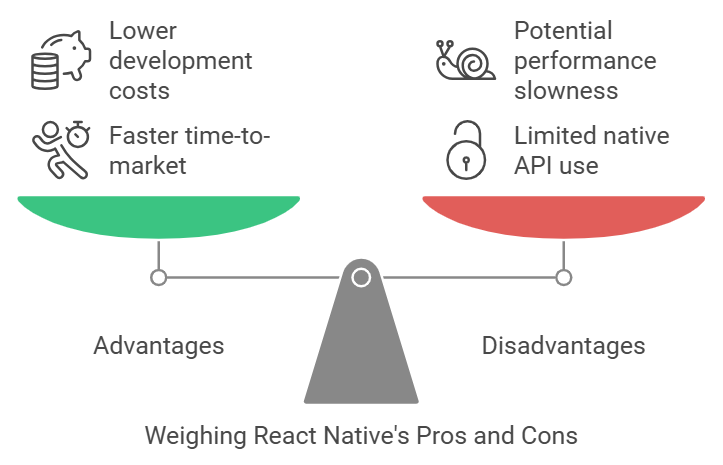
Native vs. Hybrid Mobile Development: Which is Right for Your Business?
- by mayank.thapa
The market of applications is growing, and companies are searching for solutions that allow them to provide services through the use of mobile platforms. Based on an evaluation of native mobile development vs hybrid mobile apps, companies are put forward with the following question. Each approach has its advantages and disadvantages and it is important to appreciate what each could mean for your business. This article will compare and contrast, the strengths and weaknesses of the hybrid mobile apps and native mobile development methods as well as which one will suit your needs.
What Is Native Mobile Development?
Overview of Native Apps
Native mobile development means creating applications for one specific operating system, with the use of software development kits (SDKs) readily available for a specific OS. For instance:
- Android apps use either Java or Kotlin.
- Apps developed for iOS will be in Swift or Objective C languages.
Key Features of Native Development
- Superior Performance: Such native applications work more efficiently because, hence, the consumers have faster responses to their requests.
- Access to Device Features: They are fully integrated into the handheld devices and have free access to such additional features as cameras, GPS, and sensors.
- Rich User Experience (UX): They provide application-developed UI that conforms to OS design guidelines.
Pros and Cons
Advantages:
- The system should be able to perform at the highest level of efficiency and should be highly responsive.
- Secure and reliable access to information resources is defined by improved access and security settings.
Disadvantages:
- High development costs.
- Has to be built and tested individually for each platform which proves time-consuming and resource-demanding.
What Are Hybrid Mobile Apps?
Overview of Hybrid Apps
Hybrid mobile apps are partly developed using Native and web technologies in order to give the best of both worlds. These are created using web technologies, HTML, CSS, and JS, and then are usually created and put in a native app container for app store distribution.
Key Features of Hybrid Development
- Cross-Platform Compatibility: Designers can have only a single codebase to work on and that helps in saving their precious time and effort.
- Cost-Effective: Saves time to have exclusive teams for the development of iOS and Android.
- Quick Development Cycle: A perfect option for any organization that wants to start operating as soon as possible.
Popular Frameworks
A popular approach for mobile app development with React is referred to as React Native, which allows developers to build robust applications that perform well, but share large portions of the code.
Pros and Cons
Advantages:
- Faster time-to-market.
- Lowered expenditures on the development and maintenance of designs and models.
Disadvantages:
- Native API can be used only for some specific tasks due to the limitations provided by the target device.
- Compared to native applications there might be slowness in its performance.
When to Choose Native Mobile Development
- Performance-Critical Apps: Applications that have stringent requirements for response time like game and augmented reality (AR) applications.
- Complex Functionalities: That’s especially true for projects requiring many devices to be integrated.
- Large-Scale Projects: Organizations who are willing to pay a premium price for their products.
When to Choose Hybrid Mobile Apps
- Budget Constraints: This is perfect for startup companies and small businesses only.
- Time-Sensitive Projects: For those organizations that want to enter the market as soon as possible.
- Cross-Platform Needs: When targeting both iOS and Android users but at the same time, and without needing to create content for both platforms twice.
The Role of React Native in Hybrid Mobile Apps
Hybrid application development using mobile app development with React has emerged as the best approach to closing the performance difference between hybrid and native apps. React Native offers:
- Hot Reloading: Facilitates to give developers a chance to see the changes as soon as possible.
- Reusable Components: Speeds up development.
- Access to Native APIs: Shown to offer better performance than conventional hybrid frameworks.
React Native is commonly used by companies that require low cost but are nearly indistinguishable from the native performance of hybrid mobile apps.
Factors to Consider When Choosing Between Native and Hybrid
- Target Audience: Are you expecting certain features to work perfectly for the platform you are developing or do you expect the application you are developing to work on multiple platforms?
- Budget and Resources: Is your business ready to have development teams for the development of native applications?
- Scalability: Will your app acquire more features with time?
- Maintenance Requirements: While in hybrid mobile apps, the problem of updating can be solved much more easily, the question concerning further scalability might be a problem.
Conclusion
The decision of which way to go, native mobile development, or hybrid mobile apps, then calls for a number of considerations, including the business goals, the financial strength, and the time that is available. Native apps react faster and have a good user interface and Hybrid mobile apps are cheaper to develop since they make use of existing web technologies and are also quicker to launch. Mobile app development with React is quite good, especially those developed with React Native as it offers a perfect medium that offers fairly efficient hybrid app solutions.
If you need professional advice on what best to do for your mobile application, Value Innovation Labs come up with unique solutions that are appropriate for your venture. Please contact us today at valueinnovationlabs.com so that we can arrange for a consultation for you.
Frequently Asked Questions
- What are hybrid mobile apps?
This type of app is developed with the support of HTML and JavaScript, but it has a native shell to be used on different platforms.
- What is the concept of native mobile development?
Native development entails developing an application from the ground with the help of a particular programming language of a platform, whether iOS or Android.
- Which is faster to develop: native or hybrid apps?
Like web apps, hybrid app development is quicker because the code written is platform-independent.
- Is React Native for native or hybrid applications?
React Native is used to create applications that are a blend of both web and native applications with almost native-like performance.
- Which of the two approaches is preferable for startups?
Hybrid apps could be furthermore appropriate for startups because these apps take less time and money to develop.
The market of applications is growing, and companies are searching for solutions that allow them to provide services through the…

